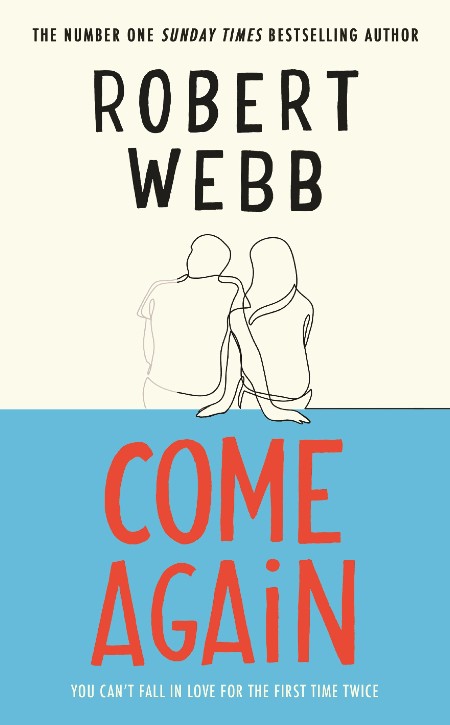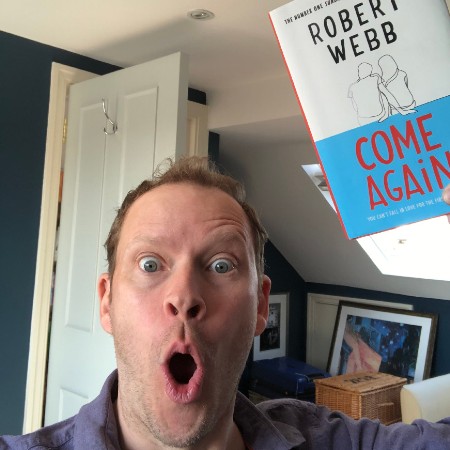
Life is, we know all too well, a one-way street.
We are born, we live, we die with no chance of going back for any kind of do-over and absolutely no prospect of taking hard-won lessons back to situations crying out for their accrued wisdom.
And yet, what if one day, after nine months of mourning the man you loved from the moment you met him, you wake up to find yourself not an alcoholic, jobless 45-year-old wisdom mired in a griefstricken present but rather an 18-year-old first year uni student with every chance in the world of setting things right and altering the course of your now-marred history?
Then you’d be Kate Marsden, a genius-level IT manager who discovers, in Robert Webb’s Come Again, that it’s not only possible to go back but that once there, you can correct the mistakes of the past which in her case is telling her dead husband Luke, who is dead no more, that he has a slow-growing tumour in his head that he might, you know, what to get removed before it suddenly claims his life.
The trick is, of course, that Kate is no longer an innocent, carefree teenager on the cusp of adulthood for whom everything is possible – an outlook which, naturally enough, colours how she reacts to everything – but a grown woman who knows that life is rarely as good in execution as it seems in the glow of nascent teenage promise.
“Well, the first time it was charming because she was in love. And being in love is when you truly live in the present: when every moment is a discovery, every tiny detail is pregnant with meaning. Grief though … grief is the opposite of meaning; grief is where the present can’t breathe; where the past is everywhere you look; where every new moment is dead on arrival. Grief is Groundhog Day.” (PP 150-151)
Which makes recreating the events of the day that she meets Luke, and her host of other lifelong friends such as Kes, Amy and Toby, quite tricky indeed.
For one thing, she knows life is a messy quagmire with few easy answers, something that influences what she says and does in a way that her 18-year-old iteration, unencumbered by life’s long wearing and disillusioning journey, simply didn’t have to concern herself with.
She simply went with events as they presented themselves to her, confident in her naivety of life’s darker moments to take people and events on face value.
Something, of course, that 45-year-old Kate does not have a chance in hell of doing — let the messy revisiting of the best moment in her life begin!
While the premise of Come Again is indisputably, gloriously and brilliantly over the top, Webb grounds it in so much humanity, the real, in-the-trenches kind which knows far too much about the worst life can do to you for its own good, that even as we are suspending our belief at the same heady rate that Kate is downing drinks and making increasingly poor decisions, we are utterly invested in the truth of what Kate is experiencing.

She has lost her husband, her beloved, beautiful, writer husband of 28 years who may not have been perfect but who seemed perfect for her, and the grief seems insurmountable, enmeshing her in inertia so strong that it costs her job, her closeness with friends and any sense that life has any kind of meaningful future.
It’s gut-wrenching stuff set against a sci-fi (ish) premise par excellence, but Webb makes it work affectingly well, alternating between witty, sparklingly-written prose, wry observations about the human condition and some passages of grief and loss so raw and real that it can’t help but dig right down into the marrow of your soul.
It’s a strange marriage of thematic bedfellows but it works passionately well, delivering up a story that has the capacity to make you cry, laugh out loud and whoop in delight, sometimes on the same page.
The only time that Come Again puts a foot wrong is in its final action-packed act.
Outlining what actually happens would be so spoiler-dense that new readers of the novel would never forgive you, but suffice to say, a renewed Kate has some decisions make, and in rapid, ill-thought-out fashion, makes them.
It’s a rip-roaring, riotous and deftly constructed end to proceedings that is a pleasure to read in every way, but it feels rather disconcertingly like a whole other book, tacked onto Come Again almost as an afterthought.
“But now, as she carefully snipped along the short edge of the book, something miraculous happened in the mind of Kate Marsden. She held the two ideas in balance; her delight in Luke and her anger; her love and her grief. Standing there in the kitchen – and without noticing – she began the long delayed process of integrating the lost past with the new present. Something in her imagination finally began the quiet work of mourning.” (P. 227)
Again, it’s not that the end is poorly-written or paced or plotted; it is none of those things, as beautifully written as the rest of the book which glows with good humour, rich, raw humanity and a gritty honesty about life that makes it a cut above many books of its genre.
It’s simply that, some neatly-tied elements aside which are enormously clever and will have you shivering with pleasure that life can be this good after so much bad, Come Again somehow segues into a wacky spy drama with romance after being nothing of the kind really up to that point.
It’s not a fatal error — you are so swept up in the pell-mell narrative and the joie de vivre and adrenaline-rushing terror that comes with it, that you happily consume each and every page, racing to see if Kate is luck enough to not only get a second chance at living but also a happy-ever-after into the bargain.
But it does feel odd and not quite in sitting with the intense emotion of the first two-thirds of a book which explores grief and loss so empathetically and insightfully that you are profoundly moved in ways that strike at the very heart of who you are.
And yes, there are wacky elements to the book which mean that the final act isn’t completely unexpected; but, in the end, it all feels too much and too overdone to make for the wholly satisfying ending you are craving and want for Kate who is as feistily beleaguered as they come.
Still, overall, Come Again is a beautifully immersive piece of writing – rich to brimming with uncomfortable truths about love and living, honest about the way we can lose ourselves, quite understandably in the unending pain of loss, and sprinkled with the kind of humour and hope that suggests that even in the very worst of circumstances, the most remarkable things can happen and we might just find a way to make life feel like it’s worth living again.